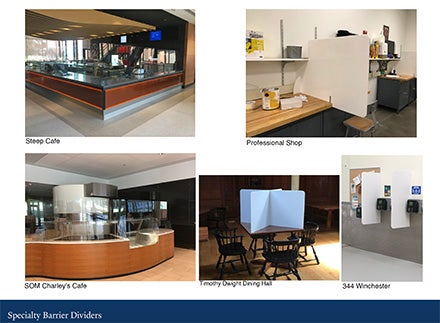We want to hear from you! Take the survey.
How do you use It’s Your Yale? How can it be improved? Answer for a chance to win Yale swag.
Yale Millwork Shop built barriers to keep the campus open (and safe)
November 24, 2020
When Yale students and other community members returned to campus this past August, they immediately saw the Yale Millwork team’s handiwork. Large and small plastic barriers had been carefully installed in dining halls, at front desks, and in offices. While many Yale staff continue to work from their homes, due to the COVID pandemic, the Millwork team went back to campus in May. Since then, they’ve been extra busy installing these clear, hard-plastic dividers, so the University could welcome people back safely.
The pandemic has forced the world to wear masks, wash hands, and physically distance. To get back to the business of working, teaching, and research, Yale had to make sure that adjustments were made, and hundreds of barriers built. This small team worked feverishly to develop and install over 600 sheets of protective plastic barriers, temporary walls, sneeze guards, and table dividers across campus, including in all the serving and dining hall areas. Also, they designed and installed the telephone-booth-like COVID testing pods found at Yale on York and the Lanman Center.
But before all that, the Millwork team had to make their area at 344 Winchester Avenue safe. They started by making and installing barriers between workbenches, timeclocks, and in the cafeteria. All the barriers and dividers are made from LEXAN polycarbonate sheets that are clear and temperature resistant. These sheets can be cut, sawn, drilled, and milled without the risk of cracking or breakage.
They started by making and installing barriers between workbenches, timeclocks, and in the cafeteria. All the barriers and dividers are made from LEXAN polycarbonate sheets that are clear and temperature resistant. These sheets can be cut, sawn, drilled, and milled without the risk of cracking or breakage.
Once their area was complete, the managers and millworkers sat down to develop a plan for making areas safe for people to return. Departments ramping up for reopening began to submit tickets for specific work areas. Each space was different, so team members had to visit individual areas to take measurements and devise how the plastic structures would attach to desks, walls, counters, hot dining surfaces, and more.
“Each area was unique, so we had to come up with different clamps and fasteners,” says Scott Neeley, Senior Supervisor Carpenters, Millwork, and Painting. “While the walls and dividers all look similar, how they are fastened is distinct. We had to be mindful of the dining areas and hot surfaces; we didn’t want anything to melt.”
Close attention was paid to the Centers for Disease Control and Prevention’s (CDC) guidelines, which changed slightly over the past few months. “We realized adjustments had to be made for people’s heights. So, at counters and in office areas, we created 7’ high barriers and partitions which the CDC recommended,” adds Scott.
The team also designed certain types of clamps that could be easily removed for cleaning, especially in areas where people were eating. To date, they’ve done 77 installations—some single dividers like at 221 Whitney Avenue or large multiple-area installations like in the colleges. The campus dining halls encompassed the largest project, with 385 sheets installed. New orders from more departments keep coming in.
All the work was done in house. The design of each piece was completed on a computer, and then the shop’s Computer Numerically Controlled (CNC) milling machine would print/cut the design out on the Polycarbonate sheets. At first, materials were hard to find. Then by happenstance, a local vendor —The Plastic Factory in Bridgeport, CT,—was found and it has greatly helped source needed materials.
One unique request was from Yale Health. They wanted protection around their portable workstations (small carts containing a computer and screen that are wheeled to each patient room.) The team came up with what they are calling the “Wow” barrier. “Yale Health is really pleased with this extra layer of protection,” says Scott. “These guys are so ingenious. I’m so proud of what they do. They all have taken this task very seriously, understanding that these structures will help keep people on campus safe.”
All this great work begs the question: What happens after COVID? The hope is Yale will never need these items again, but once this is over, the COVID test pods will be put in storage. All the other barriers, walls, and dividers belong to the individual departments. There is speculation that those pieces will be stored by the departments and hopefully collect lots of dust and cobwebs.
Special thanks to:
- Paul Cavaliere – Carpenter
- Colin Evans – Millworker
- Kevin Gardner – Millworker
- Marc Lussier – Finisher/Millworker
- Barry Vansteenbergen – Millworker
- Phil Vitale – Millworker
- John-Paulo Fernandes – Director of Plant Operations and Planning
- Michael Pizzella – Associate Director Physical Plant Operations – Structural
- Scott Neeley – Senior Supervisor Carpenters, Millwork and Painting
More stories about the Millwork Shop:
- Safety first: Yale’s millwork shop shifts gears to protect campus community
- Yale Millworkers making the new look old again


